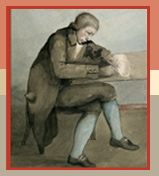
Iolo's People
Edward 'Celtic' Davies (1751-1831)
Evan Davies (Myfyr Morganwg, 1801-88)
Walter Davies (Gwallter Mechain, 1761–1849)
T C Evans (Cadrawd, 1846-1914)
Owen Jones (Owain Myfyr, 1741–1814)
Sir John Morris Jones (1864-1929)
William Owen Pughe (1759-1835)
William John Roberts (Gwilym Cowlyd, 1828-1904)
David Samwell (Dafydd Ddu Feddyg, 1751–98)
David Thomas (Dafydd Ddu Eryri, 1759–1822)
Griffith John Williams (1892-1963)
John Williams (Ab Ithel, 1811-62)
Edward Owen
Edward Owen was a journalist, barrister and antiquarian. He entered the Civil Service and was appointed to the India Office. He spent his leisure time researching in the British Museum and the Public Record Office and published the fruits of his research in the four volumes entitled Catalogue of the MSS. Relating to Wales in the British Museum. He was the first secretary (1908) of the Royal Commission of Ancient Monuments in Wales and editor of the Commission's publications. In 1886 he criticized Iolo Morganwg's methods:
Viewed by the cold eye of the impartial critic, nothing that is too severe can be said of the methods pursued by this school in their indiscriminate glorification of everything connected with Wales and its history, It is not too much to say that as the influence of the Historia of Geoffrey of Monmouth is to be traced in the works of almost every mediæval historian who came in contact with that tissue of fables, so did Edward Williams's influence affect all who came within the range of his magnetic personal power. As Geoffrey had been able by the fascinating form of his legends to lay the clearest intellects of the Middle Ages under his spell, so was Iolo Morganwg through the sheer force of his individuality able to impose his views upon men of much greater learning than himself. Endowed with indefatigable energy, burning with a patriotism that was ever at the white heat of enthusiasm, and possessed with the idea that whatever redounded to the glory of Cambria must be accepted and supported with implicit faith and unswerving devotion-no wonder he exercised such power over his contemporaries as to warp their judgments and take captive their common sense. His influence upon the minds of his countrymen is only now losing its hold through the advances of a more scientific and critical method. One of the greatest debts which Welsh scholarship owes to the memory of Thomas Stephens, of Merthyr, is due to his steadfast opposition through much evil report to the wild speculations and monstrous assumptions of the Morganwg school, and to his firm purpose of proving all things and holding to those alone which he believed to be true.

